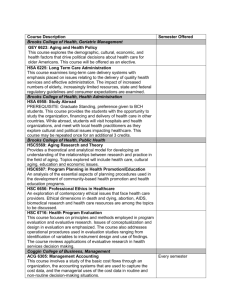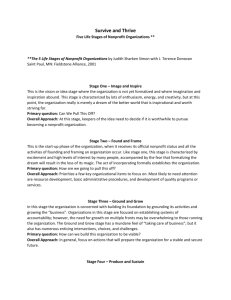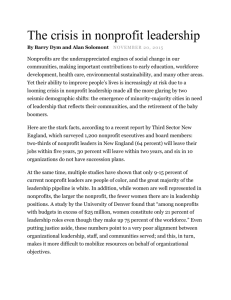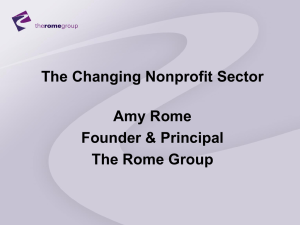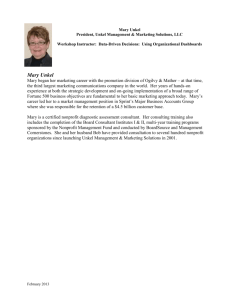ARIZONA UNIVERSITY SYSTEM - Arizona State University
advertisement
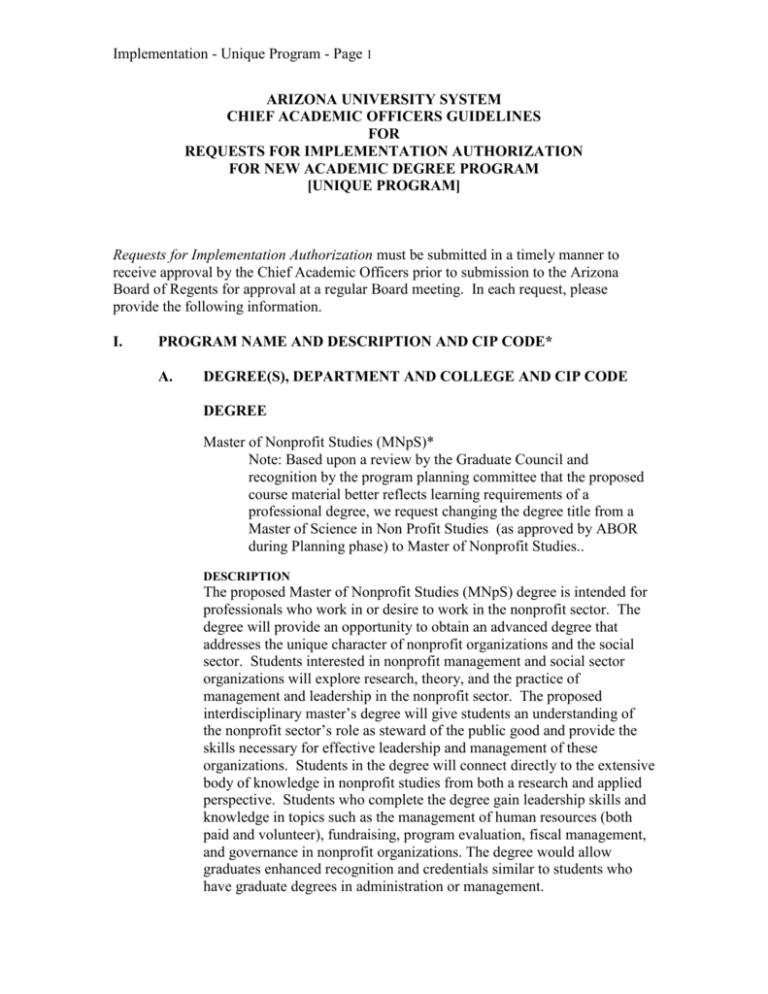
Implementation - Unique Program - Page 1 ARIZONA UNIVERSITY SYSTEM CHIEF ACADEMIC OFFICERS GUIDELINES FOR REQUESTS FOR IMPLEMENTATION AUTHORIZATION FOR NEW ACADEMIC DEGREE PROGRAM [UNIQUE PROGRAM] Requests for Implementation Authorization must be submitted in a timely manner to receive approval by the Chief Academic Officers prior to submission to the Arizona Board of Regents for approval at a regular Board meeting. In each request, please provide the following information. I. PROGRAM NAME AND DESCRIPTION AND CIP CODE* A. DEGREE(S), DEPARTMENT AND COLLEGE AND CIP CODE DEGREE Master of Nonprofit Studies (MNpS)* Note: Based upon a review by the Graduate Council and recognition by the program planning committee that the proposed course material better reflects learning requirements of a professional degree, we request changing the degree title from a Master of Science in Non Profit Studies (as approved by ABOR during Planning phase) to Master of Nonprofit Studies.. DESCRIPTION The proposed Master of Nonprofit Studies (MNpS) degree is intended for professionals who work in or desire to work in the nonprofit sector. The degree will provide an opportunity to obtain an advanced degree that addresses the unique character of nonprofit organizations and the social sector. Students interested in nonprofit management and social sector organizations will explore research, theory, and the practice of management and leadership in the nonprofit sector. The proposed interdisciplinary master’s degree will give students an understanding of the nonprofit sector’s role as steward of the public good and provide the skills necessary for effective leadership and management of these organizations. Students in the degree will connect directly to the extensive body of knowledge in nonprofit studies from both a research and applied perspective. Students who complete the degree gain leadership skills and knowledge in topics such as the management of human resources (both paid and volunteer), fundraising, program evaluation, fiscal management, and governance in nonprofit organizations. The degree would allow graduates enhanced recognition and credentials similar to students who have graduate degrees in administration or management. Implementation - Unique Program - Page 2 SCHOOL AND COLLEGE: School of Community Resources and Development, College of Public Programs CIP CODE: 52.0206 Nonprofit/Public/Organizational Management B. PURPOSE AND NATURE OF PROGRAM There is an increasing number of graduate level nonprofit management programs. The Nonprofit Academic Centers Council (NACC) reported in 2003 more than 242 colleges and universities across the nation offering at least one course in nonprofit management/administration, including 91 schools that offer a graduate concentration (three or more courses). NACC developed “Curricular Guidelines for Graduate Study in Philanthropy, the Nonprofit Sector and Nonprofit Leadership”. These guidelines were used in the development of this degree. This Master’s degree will allow students to connect with the growing body of knowledge in nonprofit studies in response to increasing numbers of career positions in the field. Students will gain an appreciation of the social sector as a fundamental contributor to the quality of life in communities. In particular, nonprofit organizations will be identified as instrumental actors in the social sector and in particular, the unique challenges of operating nonprofit organizations will be explored. Students will benefit from a range of inter-disciplinary perspectives to gain an understanding of nonprofit organizations and the social sector. These theoretical and disciplinary perspectives will be blended with practitioner experiences and skill development to help develop leaders for the nonprofit sector. Graduates will be able to contribute effectively in the management of nonprofit organizations. They will understand the challenges of social sector management and gain skills for effective performance. They will be able to contribute to nonprofit organizational growth and development in several ways. For instance they will gain an understanding of voluntary behavior, governance and leadership in nonprofits, and the multiplicity of resource development opportunities. OBJECTIVES OF THE PROGRAM: To provide students knowledge, skills and competencies in the field of nonprofit studies at the graduate level. Implementation - Unique Program - Page 3 C. To provide students with an understanding of the nonprofit sector as a unique part of the social, political, economic, and philanthropic fabric of American society with an appreciation for the unique contribution to the way in which nonprofit organizations improve the quality of life for community members. To provide society with graduates prepared for leadership roles in the nonprofit sector. To fulfill Arizona’s need for experts who can play key leadership roles in the nonprofit sector in the state and the region. PROGRAM REQUIREMENTS Potential applicants who hold a bachelor’s degree from a regionally accredited institution are eligible to apply. Applications will be accepted year-round and students may be granted admission for fall, spring or summer semesters. Students must submit the following to apply for the Masters in Nonprofit Studies: completed application form to the Division of Graduate Studies (DGS), statement of educational and career goals in sufficient detail to indicate compatibility with the educational objectives and capabilities of the School, three reference letters, and curriculum vita or resume. Applicants whose Jr/Sr GPA is above 3.0 are eligible to apply for admission to the program. The MNpS will consist of a minimum of 33 credit hours. Students will be required to take 18 credits of core coursework, 3 units of which are a capstone course that will be completed at the end of the student’s program of study. The course will be integrative and case-based allowing students to synthesize material from prior coursework. Successful completion of this course will be required in place of a thesis or applied project. Students will also complete 15 credits of related elective coursework. In addition to Nonprofit Leadership and Management NLM offered courses, the list draws from two contributing disciplines (public affairs and social work) to foster the interdisciplinary nature of the degree. Students may include two 3-credit courses not listed below on their program of study as long as they can establish an intellectual and professional development objective that substantiates the courses. Core Courses (18 Credits) NLM 510 Foundations in Nonprofit Management1(existing) NLM 520 Financial Management in NP*1(existing) NLM 540 Volunteer & Human Resource Management in NP 1(existing) Implementation - Unique Program - Page 4 NLM 550 Philanthropy: Theory and Practice (existing) NLM 501 Program Evaluation & Information Management (existing) NLM 620 Capstone: Critical Issues in NP Management** (new course) Related Elective Courses (15 Credits) NLM 560 Leadership & Ethics in NP* (existing) NLM 562 Social Entrepreneurship (taught for the first time spring 05) NLM 580 Practicum (existing) NLM 610 Executive Leadership & Governance (new course) PAF 508 Organization Behavior (existing) PAF 529 Organization Change and Development (existing) PAF 541 Program Evaluation (existing) PAF 591 Art & Public Policy (existing) REC 500 Research Methods (existing) REC 503 Introduction to Statistics (new course, scheduled for fall 2006) SWG 531 Social Policy and Services (existing) SWG 580 Community & Organizational Change (existing) SWG 682 Community Participation Strategies (existing) SWG 683 Developing Grants and Fundraising (existing) Up to two 3-credit courses in a related field as approved by faculty advisor * Taught by public affairs 1 Required in current certificate A typical program of study for a full-time MNpS student is listed below. Students will be able to complete the program on a part-time basis as well. Courses will be offered in a flexible format (evenings and weekends) to meet the need of students. Fall 1 NLM 510 Foundations in Nonprofit Management NLM 540 Volunteer & Human Resource Management in NP NLM 550 Philanthropy: Theory and Practice Cr 3 3 3 Spring 1 NLM 520 Financial Management in NP NLM 501 Program Eval & Info Management Related Elective 1 3 3 3 Summer Related Elective 2 Related Elective 3 3 3 Fall 2 NLM 620 Capstone: Critical Issues in NP Management Related Elective 4 Related Elective 5 D. 3 3 3 CURRENT COURSES AND EXISTING PROGRAMS The proposed degree will extend the academic requirements of the current graduate certificate program with additional course offerings to complete Implementation - Unique Program - Page 5 the degree program. In 2000, a graduate certificate program in Nonprofit Leadership and Management was established at ASU. More than 20 students have received the graduate certificate in nonprofit leadership and management with most pursuing it as non-degree students. There are currently 13 admitted certificate students taking classes during the 20052006 academic year. Another 10 students are taking classes toward the certificate, but have not formally applied to the program. We will retain the certificate because it responds to unique educational needs exhibited by current Master’s students in other programs (i.e., Social Work, Public Affairs, Fine Arts) and professionals in the field who already have a Master’s degree, but desire additional training in nonprofit studies. The following courses are currently offered through the School of Community Resources and Development (REC), the Nonprofit Leadership and Management (NLM) program, School of Public Affairs (PAF), and School of Social Work (SWG): I. Core Courses that exist NLM 510 Foundations in Nonprofit Management NLM 520 Fiscal Management in NP* NLM 540 Volunteer & Human Resource Management in NP NLM 550 Philanthropy: Theory and Practice NLM 501 Program Evaluation & Information Management II. Related Courses that exist NLM 560 Leadership & Ethics in NP* NLM 580 Practicum (up to 6 credits) NLM 590 Independent Study (instructor approval) PAF 508 Organizational Behavior PAF 529 Organization Change and Development PAF 541 Program Evaluation PAF 591 Art & Public Policy REC 500 Research Methods SWG 531 Social Policy and Services SWG 580 Community & Organizational Change SWG 682 Community Participation strategies (Prereq. or approval) SWG 683 Developing Grants and Fundraising * offered by PAF E. NEW NLM COURSES NEEDED NLM 562 Social Entrepreneurship Course Description: Explores social innovation for the common good and business concepts/skills related to earned income and innovation in nonprofits. (Syllabus attached) Implementation - Unique Program - Page 6 NLM 610 Executive Leadership and Governance (3 hours) Course Description: Examines the multiplicity of roles for executives and board of directors in providing strategic leadership for nonprofits. (prerequisite – NLM510) (Syllabus attached) NLM 620 Capstone: Critical Issues in NP Management Course Description: Students identify and review key issues confronting the nonprofit sector, while integrating learning from the entire program. (prerequisite – NLM510) (Syllabus attached) F. II. REQUIREMENTS FOR ACCREDITATION – N/A STUDENT LEARNING OUTCOMES AND ASSESSMENT A. What are the intended student outcomes, describing what students should know, understand, and/or be able to do at the conclusion of this program of study? Based on the National Association of Schools of Public Affairs and Administration’s (NASPAA) Guidelines for Graduate Professional Education in Nonprofit Organizations, Management and Leadership, a series of essential competencies both unique and non-unique to the nonprofit sector were utilized to determine essential elements related to student educational outcomes. This was further informed by NACC’s curricular guidelines for graduate study in philanthropy, the nonprofit sector, and nonprofit leadership. 1) Education Outcomes (Nonprofit Elements) are educational outcomes that involve advanced knowledge of elements unique to nonprofits such as history, values, ethics, philosophies, legal structure, revenue and governance issues. Indicator: Participation in core and related class requirements Assessment: Satisfactory completion of course requirements (i.e., exams, projects and assignments). 2) Education Outcomes (Non-unique to Nonprofits) are educational outcomes that advanced knowledge of management and leadership elements such as resource management, external relations, interorganizational and inter-sectorial relations, environmental issues, quantitative analysis and information technology, performance measures, program evaluation, policy making processes, economic and market issues, and globalization topics. Indicator: Participation in core and related class requirements Assessment: Satisfactory completion of course requirements (i.e., exams, projects and assignments). Implementation - Unique Program - Page 7 3) Demonstrate command of subject matter including ability to analyze, integrate and synthesize key material. A capstone course will use case studies to foster a review and integration of key principles in the degree. Indicator: Participation in capstone course, written case study response papers and final paper. Assessment: Faculty review of papers and oral presentation. B. Provide a plan for assessing intended student outcomes. Please see above for assessment plans. III. STATE'S NEED FOR THE PROGRAM A. HOW DOES THIS PROGRAM FULFILL THE NEEDS OF THE STATE OF ARIZONA AND THE REGION? Diverse in size and scope, the nonprofit sector has become a major force in the United State’s economy, generating approximately eight percent of the GNP. The sector has, with some exceptions, expanded faster than other sectors of the economy over the past two decades. Employment in the nonprofit sector during the same period grew an average of 3.3 percent annually, compared with 1.6 percent in government and 1.8 percent in business; as of 2001 the sector employed over 12.5 million people. There continues to be significant growth in the number of nonprofit entities in Arizona; currently there are between 25,000 and 30,000 nonprofit organizations in the state. The Arizona nonprofit sector paid an estimated $3.24 billion in wage compensation in 2002 and received volunteer labor worth an estimated $7.33 billion. Yet there is no graduate degree available for leaders of the nonprofit sector in the state. B. IS THERE SUFFICIENT STUDENT DEMAND FOR THE PROGRAM? The anticipated student enrollment in this program is expected to be 25 students by fall 2010. There are many students currently enrolled in the graduate certificate program and American Humanics certificate that would be interested in this type of degree program. In addition, the degree and its location at the downtown Phoenix campus will be attractive to many nonprofit working professionals due to its physical location. 1. What is the anticipated student enrollment for this program? Implementation - Unique Program - Page 8 Year Student Majors 2. 5-YEAR PROJECTED ANNUAL ENROLLMENT 1st Year 2nd Year 3rd Year 4th Year 10 14 17 21 5th Year 25 What is the local, regional and national need for this program? Currently, there is no Master’s degree in Nonprofit Studies/administration or management in any Arizona public or private institution. The University of Arizona does offer a nonprofit concentration as part of their MPA degree. According to a study and national database developed by Seton Hall University only five WICHE institutions offer a distinctive Masters degree in Nonprofit Studies/Management or Administration (see Section V, part B). Twenty-three other institutions offer some array of graduate courses, but no separate degree, 15 of which are recognized by NASPAA as offering a nonprofit concentration or specialization. The limited number of degree programs is set within the dramatic growth of the nonprofit sector nationally and regionally. As the nonprofit sector grows, the demand for professionally trained graduates will also significantly increase the employment opportunities. 3. Year Number Degrees IV. Beginning with the first year in which degrees will be awarded, what is the anticipated number of degrees that will be awarded each year for the first five years? 5-YEAR PROJECTED NUMBER OF DEGREES 1st Year 2nd Year 3rd Year 4th Year 8 9 13 18 5th Year 21 APPROPRIATENESS FOR THE UNIVERSITY – This proposed degree is consistent with ASU’s vision of “making quality public post-baccalaureate higher education accessible to all qualified citizens of Arizona.” The Master in Nonprofit Studies would contribute to the mission of Arizona State University by offering a program that serves the metropolitan community needs and by fulfilling the human resource needs of Maricopa County’s nonprofit sector and the southwest. A number of urban universities also offer emphasis area programs (not degrees) including California State University at Los Angeles, Chicago State University, City University of New York Baruch College, and the University of San Francisco. As the growth of nonprofits across the country and particularly in the Metropolitan Phoenix area continues to escalate, the location of this degree at Implementation - Unique Program - Page 9 ASU Downtown Phoenix campus is highly appropriate and meets the needs of the Arizona academic and nonprofit community, while partnering with other programs (i.e., public affairs and social work) at the downtown campus. The proposed master’s degree program will integrate effectively with the newly named School of Community Resources and Development to be located on the new Phoenix Downtown Campus. The location will provide access to nonprofit agencies in downtown Phoenix and centrally located between the East and West valley. Currently the Center for Nonprofit Leadership and Management maintains an office and offers its non-credit Nonprofit Management Institute courses and workshops at a downtown center site. V. EXISTING PROGRAMS AT OTHER CAMPUSES A. EXISTING PROGRAMS IN ARIZONA -1. For a unique (non-Duplicative) program, provide a statement to the effect that there are no existing programs at other Arizona public universities that duplicate the proposed program. The Master of Nonprofit Studies in the School of Community Resources and Development at Arizona State University will be unique among the master’s degree programs offered by the three public universities in Arizona. The University of Arizona within its School of Public Administration and Policy requested authorization for a concentration in Nonprofits and Local Governments during the 2003-04 academic year. The concentration is part of the Master’s degree in Public Administration (MPA). 2. Other Institutions -- If this program is not currently offered at the same academic level by private institutions in the state of Arizona, provide a statement to that effect. If a similar program is currently offered by private institutions, list all programs and indicate whether the institution and the program are accredited. (A list of institutions will be provided by Board staff. Please utilize the following tabular format and contact Board staff for assistance, if needed). The Master of Nonprofit Studies in the School of Community Resources and Development at Arizona State University will be Implementation - Unique Program - Page 10 unique among the master’s degree programs offered by the private institutions in Arizona. B. PROGRAMS OFFERED IN OTHER WICHE STATES 1. 1 2 3 4 5 VI. Identify WICHE institutions that currently offer this program. If appropriate, briefly describe the programs. PROGRAMS OFFERED IN OTHER WICHE STATES WICHE NCA Program PROGRAM INSTITUTION Accreditation? Accreditation? (Y or N) & LOCATON ( Y or N) MA NP Mgt; University of N/A N/A MBA in NP Judaism, Los Mgt. Angeles Masters NP University of San N/A N/A Leadership & Diego, San Diego, Mgt. Studies CA Masters NP University of San N/A N/A Admin. Francisco, San Francisco, CA Masters NP Regis University, Y N/A Mgt. Denver, CO Exec. Masters Seattle Univ, N/A N/A in Not-forSeattle, WA Profit Leadership EXPECTED FACULTY AND RESOURCE REQUIREMENTS A. FACULTY 1. Current Faculty Name Rank Doctorial Dissertations Masters Theses Practicum Highest Degree Level of Involvement Robert Ashcraft Associate Professor 0 5 Ph.D. Instructor William Brown Assistant Professor 0 5 Ph.D. Instructor/Coordinator Kelly Campbell Lecturer 0 0 Ph.D. Instructor Chao Guo Assistant Professor 0 0 Ph.D. Instructor Carlton Yoshioka Professor 2 28 Ph.D. Instructor Robert Denhardt Professor 5 0 Ph.D. Instructor Implementation - Unique Program - Page 11 Laura Peck Elizabeth Segal William Voorhees 2. Assistant Professor 0 0 Ph.D. Instructor Professor 7 7 Ph.D. Instructor Assistant Professor 0 0 Ph.D. Instructor Additional Faculty The Provost Office has approved and funded a new nonprofit tenure track position for the 2006-07 academic year. 3. Current FTE Students and Faculty The School of Community Resources and Development has for the 2004-2005 academic year a total of 930 FTE students (867 FTE undergraduate and 63 FTE graduate), and 13 full-time faculty. 4. Projected FTE Students and Faculty The projected FTE include the current total for the School of Community Resources and Development, and the projected threeyear FTE for the Master’s degree in Nonprofit Studies. Current Year 1 Year 2 Year 3 2004-05 Undergraduate FTE 867 948 964 983 Graduate FTE 63 75 (12)* 79 (16)* 82 (19*) Total FTE 930 1035 1056 1082 Faculty 13 13 14 14 *Numbers in parentheses reflect growth as a result of the new degree B. LIBRARY 1. Current Relevant Holdings: Current library resources are sufficient to support this program and sufficient resources will be available at the Downtown Phoenix campus. 2. Additional Acquisitions Needed: Current library resources are sufficient to support this program and sufficient resources will be available at the Downtown Phoenix campus. Implementation - Unique Program - Page 12 C. PHYSICAL FACILITIES AND EQUIPMENT 1. Existing Physical Facilities: Current classroom facilities on Tempe Campus and those proposed for the Downtown Phoenix campus are adequate. 2. Additional Facilities Required or Anticipated: Current classroom facilities on Tempe Campus and those proposed for the Downtown Phoenix campus are adequate for the first three years. D. OTHER SUPPORT 1. Other Support Now Available: The School of Community Resources and Development support staff includes a business manager, senior program coordinator, AH program coordinator, undergraduate academic advisor, computer support specialist, office specialist, and student workers. 2. Other Support Needed, Next Three Years: As student participation increases an additional part-time staff member would be needed. VII. FINANCING A. SUPPORTING FUNDS FROM OUTSIDE SOURCES: NA B. NEW ACADEMIC DEGREE PROGRAM BUDGET PROJECTIONS FORM: See attached budget. VIII. OTHER RELEVANT INFORMATION ________________________________________________________________________ ADDITIONAL INSTRUCTIONS FOR HOW TO FORMAT THE REPORT In order to ensure consistency headings and bolding should follow the format of this guideline. Leave a one-inch margin at the top so that the Board office can paginate all documents.


